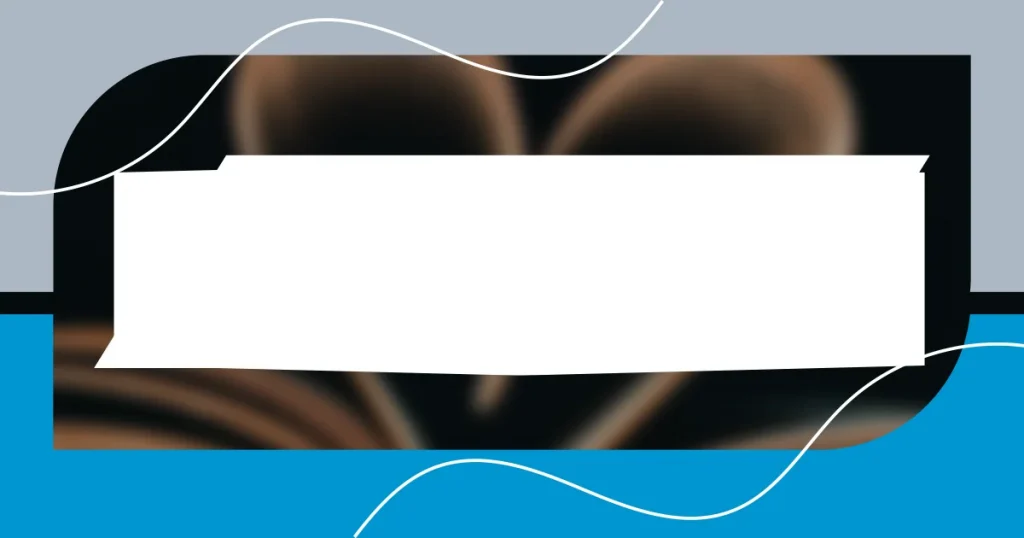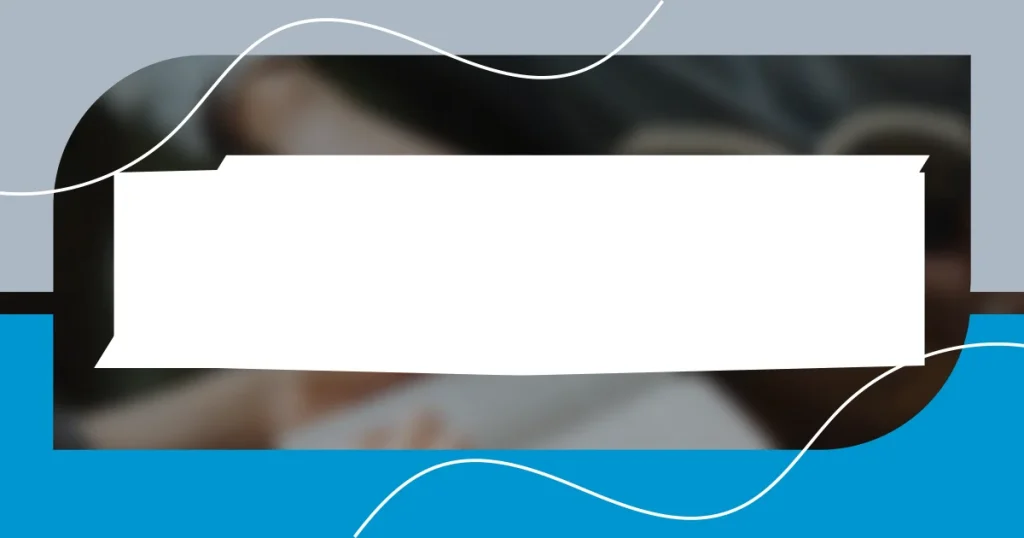Key takeaways:
- Identifying your reading goals enhances both your reading experience and the quality of your reviews, guiding your choices between pleasure, self-improvement, or research.
- Choosing the right books involves considering your mood and interests, leading to authentic connections that enrich your reviews and reflections.
- Effective note-taking and structuring your review with summaries, personal opinions, and engaging conclusions foster deeper insights and invite reader reflection.

Understanding your reading goals
Understanding your reading goals is the first step in becoming an effective reviewer. Have you ever finished a book and realized it didn’t quite align with what you were hoping to achieve? I’ve been there, and it often feels disappointing. Knowing whether you’re reading for pleasure, self-improvement, or research can guide your choices and enhance your reviewing experience.
When I look at my bookshelf, I see a mix of genres and authors. Some books offer a delightful escape, while others challenge my perspectives or teach me something new. It’s like curating a personal library of goals, each spurring different reflections. Think about what you’re really seeking; is it knowledge, entertainment, or a bit of both? This clarity will not only enrich your reading experience but will also shape the insights you gather while reviewing.
Having specific reading goals changes how I approach each book. For instance, when I read a self-help title, I find myself jotting down actionable points I can use in daily life. On the other hand, a gripping novel might evoke more emotional responses than critical analysis. Why does this matter? Because how I connect with a book deeply influences how I later reflect and write about it. So, what do you want from your next read? Identifying that might be the key to unlocking deeper reviews.

Choosing the right books
Choosing the right book can feel like navigating a vast ocean of options. I remember sifting through countless titles, only to find that some just didn’t connect with me. It’s about more than the cover or the blurb; it’s essential to consider your mood and current interests. For instance, on days when I’m feeling contemplative, I lean towards philosophical works, while on lighter days, a whimsical fantasy often suits my spirit better. How do you decide which book to pick?
Diving deeper into a specific genre can refine your choices. When I began exploring historical fiction, I was surprised by how much I enjoyed learning about past events wrapped in engaging narratives. Each genre has its own unique flavor, much like exploring various cuisines; the more you try, the more you discover what truly excites you. This exploration not only enhances your reading experience but shapes your overall perspective, influencing how you reflect on the books you review.
Ultimately, the right book is about harmony. It’s that perfect alignment between your current state of mind and the story waiting to unfold. I’ve often experienced moments of serendipity when I’ve stumbled upon a book that resonated with my emotions at just the right time. These experiences make my reviews feel authentic and heartfelt, drawing readers in. It’s a powerful reminder that the journey of choosing a book is as significant as the reading itself.
| Considerations | Personal Experience |
|---|---|
| Mood | Choosing a fantasy book on a stressful day uplifted my spirits. |
| Genre exploration | Diving into historical fiction expanded my understanding of different cultures. |

Taking effective notes while reading
Taking effective notes while I read can transform my understanding of a book. I’ve discovered that jotting down my thoughts in the moment—not just summaries but my emotional reactions—helps me connect on a deeper level. For example, when I read a passage that strikes a chord, I’ll note not just the words, but how they make me feel. This practice not only captures my instinctive responses but later informs my reviews with genuine insight.
Here are some practical tips I’ve found useful for taking effective notes while reading:
- Highlight key phrases: Focus on quotes or sentences that resonate with you; they often encapsulate the author’s core ideas.
- Use sticky notes: These are great for marking pages that may require a deeper dive later on.
- Write in the margins: I often scribble my thoughts beside paragraphs to capture my immediate reactions.
- Summarize after chapters: Take a moment to synthesize what you’ve just read; this helps consolidate your understanding.
- Create thematic lists: As I read, I like to keep track of recurring themes or motifs, which can be insightful for analysis later.
This method has helped me create a dialogue with the text, leading to more vibrant and personal reviews.

Analyzing themes and characters
Analyzing themes and characters in a book is like uncovering the layers of an onion—each layer reveals something new about the story’s essence. I often find myself reflecting on how characters embody certain themes. For instance, when I read a novel centered around resilience, I pay close attention to characters who struggle yet triumph, as they provide a tangible expression of that theme. Have you ever felt inspired by a character’s journey?
I like to dig deeper into the motivations behind characters’ actions. This analysis not only reveals their complexity but also sheds light on the broader themes they represent. One time, while reading a contemporary fiction piece, I discovered that the protagonist’s pursuit of happiness mirrored the book’s exploration of societal pressures. It’s fascinating how characters can serve as vessels for the themes, engaging us and prompting us to think critically about our lives.
Additionally, I believe examining the relationships between characters unveils underlying messages in the narrative. When characters interact, their conversations often highlight key conflicts or themes. For example, I once noted a powerful dialogue between two friends that showcased loyalty against the backdrop of personal ambition. This moment made me reconsider the delicate balance between personal desires and our commitments to others. How do you interpret the dynamics between characters in your favorite books?

Structuring your review
Structuring your review is essential to effectively convey your thoughts and engage your readers. I often find that starting with a brief summary helps set the stage; it provides context without giving away spoilers. I remember one time, after I wrapped up a particularly gripping novel, my summary helped a friend who hadn’t read it yet grasp the core themes without ruining the surprises. It’s all about balance.
Once I lay out the summary, I dive into the heart of my opinions—this is where I can truly express my feelings. I make sure to touch on pivotal characters and themes, as well as the overall writing style. For instance, while reviewing a fantasy book, I was captivated by its lush world-building. I shared how it transported me and why it resonated so deeply with my own love for escapism. Such details make the review relatable and vivid.
Finally, I always wrap up with my final thoughts, highlighting what I learned or how it impacted me. Did it inspire me to think differently? Did it evoke certain emotions? These reflections create a memorable conclusion, inviting readers to not only understand my perspective but also to reflect on their own experiences with the book. Have you ever felt a book changed your view on something important? That’s the kind of connection I aim to foster in my reviews.

Writing an engaging conclusion
An engaging conclusion serves as the cherry on top of your review, leaving readers with a lasting impression. I remember after finishing a gripping thriller; my concluding thoughts centered on the unexpected twists that left me breathless. By emphasizing how the narrative’s tension mirrored real life, I invited readers to consider their own experiences with uncertainty and how they navigate similar twists and turns in their lives. Isn’t it amazing how a story can reflect our reality?
Moreover, I always try to end on a note that prompts reflection. For instance, I once reviewed a deeply thought-provoking memoir, and as I wrapped up, I shared personal lessons that resonated with me long after closing the book. Questions like, “What personal challenges have you faced that helped to shape who you are today?” can spark dialogue among readers, encouraging them to connect their stories with the narrative. Wouldn’t you agree that this connection makes the reading experience richer?
Ultimately, striking the right balance between summarizing key points and introducing a fresh perspective is crucial. When crafting my conclusions, I often revisit a theme discussed earlier in the review but with a new light—almost like foreshadowing a deeper understanding gained from the reading journey. In one of my reviews, framing my final thoughts around the concept of vulnerability led readers to reflect on their emotional openness. It’s these nuanced layers that keep the conversation active and engaging beyond the page. How do you prefer to wrap up your book reviews?

Sharing your review with others
Sharing your review with others opens up a fantastic dialogue about the book you’ve just read. I love discussing my thoughts with friends or online communities, where I can gauge their reactions and hear differing perspectives. There’s something enriching about seeing how others connect with the same material—it’s like catching a glimpse of a different world through another person’s eyes.
Social media platforms can be an excellent avenue for sharing reviews as well. When I post a review on Instagram or Goodreads, I often engage with other readers who share similar tastes. I remember posting a review for a compelling literary fiction piece, and it sparked a conversation that led to unexpected recommendations and deep connections over our shared love for the genre. Have you ever noticed how a single review can lead to discovering your next favorite book?
Additionally, participating in book clubs is another rewarding way to share insights. I once joined a local book club that met monthly, and it was fascinating to discuss our interpretations of the same novel—often revealing layers I hadn’t noticed before. This kind of interaction not only deepens your understanding but creates a community of passionate readers. Isn’t it a wonderful feeling to be part of a group that values the same stories you do?
















